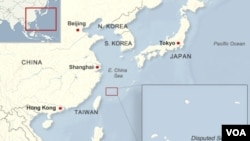BEIJING —
U.S. Defense Secretary Chuck Hagel and his Chinese counterpart challenged each other over China's policy goals in the region during a meeting in Beijing Tuesday. Hagel is on a three day trip to China aimed at improving military ties between the two countries.
Hagel criticized China’s decision in November to create an air defense identification zone over contested territory with Japan in the East China Sea.
"The United States has been very clear on this issue. And that is that, first, every nation has a right to establish air defense zones, but not a right to do it unilaterally, with no collaboration, no consultation," he said. "That adds to tensions, misunderstandings, and could eventually add to, and eventually get to, dangerous conflict."
The defense secretary arrived in Beijing after a stop in Japan, where he told reporters that China must be more open about its military build-up and better respect its neighbors.
Responding to Hagel's criticism, Chang said China would never unnecessarily provoke Japan but would remain prepared to safeguard its territory.
Regarding territorial disputes over islands and reefs and maritime borders, Chang said China "stands ready to resolve the issues through negotiations with the countries directly involved." China and Japan are embroiled in a territorial dispute over a contested chain of islands in the East China Sea, called the Diaoyu in China and Senkaku in Japan. The islands are in waters potentially rich in natural resources and provide valuable grounds for fishermen.
Last fall China established an air defense identification zone over the islands, where it claimed the right to take retaliatory action against any aircraft that had not sought prior approval to fly through the zone.
Washington and Beijing have also been at odds over cyberattacks. The United States has accused China of carrying out persistent online attacks against U.S. government agencies and private American companies. Hagel is expected to press the Chinese for greater transparency in their cyberattacks policy, with pledges that the United States will reciprocate.
Xiaohe Cheng, a professor of International Relations at Renmin University, said the military culture of both Secretary Hagel and Minister Chang could help improve communication on delicate issues.
"Hagel is not a diplomat. He is a military guy, and he is supposed to speak with his Chinese counterparts in a frank way, and I think his Chinese counterparts will also behave in similar ways," Xiaohe said.
On Monday, Hagel became the first foreign official to tour China’s only aircraft carrier, called the Liaoning. He toured the flight deck, living quarters, medical facilities and flight control station. The Liaoning is not fully operational but does have the ability to launch fighter planes. The ship serves as a powerful example of China’s rapidly growing military might.
Hagel criticized China’s decision in November to create an air defense identification zone over contested territory with Japan in the East China Sea.
"The United States has been very clear on this issue. And that is that, first, every nation has a right to establish air defense zones, but not a right to do it unilaterally, with no collaboration, no consultation," he said. "That adds to tensions, misunderstandings, and could eventually add to, and eventually get to, dangerous conflict."
The defense secretary arrived in Beijing after a stop in Japan, where he told reporters that China must be more open about its military build-up and better respect its neighbors.
Responding to Hagel's criticism, Chang said China would never unnecessarily provoke Japan but would remain prepared to safeguard its territory.
Regarding territorial disputes over islands and reefs and maritime borders, Chang said China "stands ready to resolve the issues through negotiations with the countries directly involved." China and Japan are embroiled in a territorial dispute over a contested chain of islands in the East China Sea, called the Diaoyu in China and Senkaku in Japan. The islands are in waters potentially rich in natural resources and provide valuable grounds for fishermen.
Last fall China established an air defense identification zone over the islands, where it claimed the right to take retaliatory action against any aircraft that had not sought prior approval to fly through the zone.
Washington and Beijing have also been at odds over cyberattacks. The United States has accused China of carrying out persistent online attacks against U.S. government agencies and private American companies. Hagel is expected to press the Chinese for greater transparency in their cyberattacks policy, with pledges that the United States will reciprocate.
Xiaohe Cheng, a professor of International Relations at Renmin University, said the military culture of both Secretary Hagel and Minister Chang could help improve communication on delicate issues.
"Hagel is not a diplomat. He is a military guy, and he is supposed to speak with his Chinese counterparts in a frank way, and I think his Chinese counterparts will also behave in similar ways," Xiaohe said.
On Monday, Hagel became the first foreign official to tour China’s only aircraft carrier, called the Liaoning. He toured the flight deck, living quarters, medical facilities and flight control station. The Liaoning is not fully operational but does have the ability to launch fighter planes. The ship serves as a powerful example of China’s rapidly growing military might.





